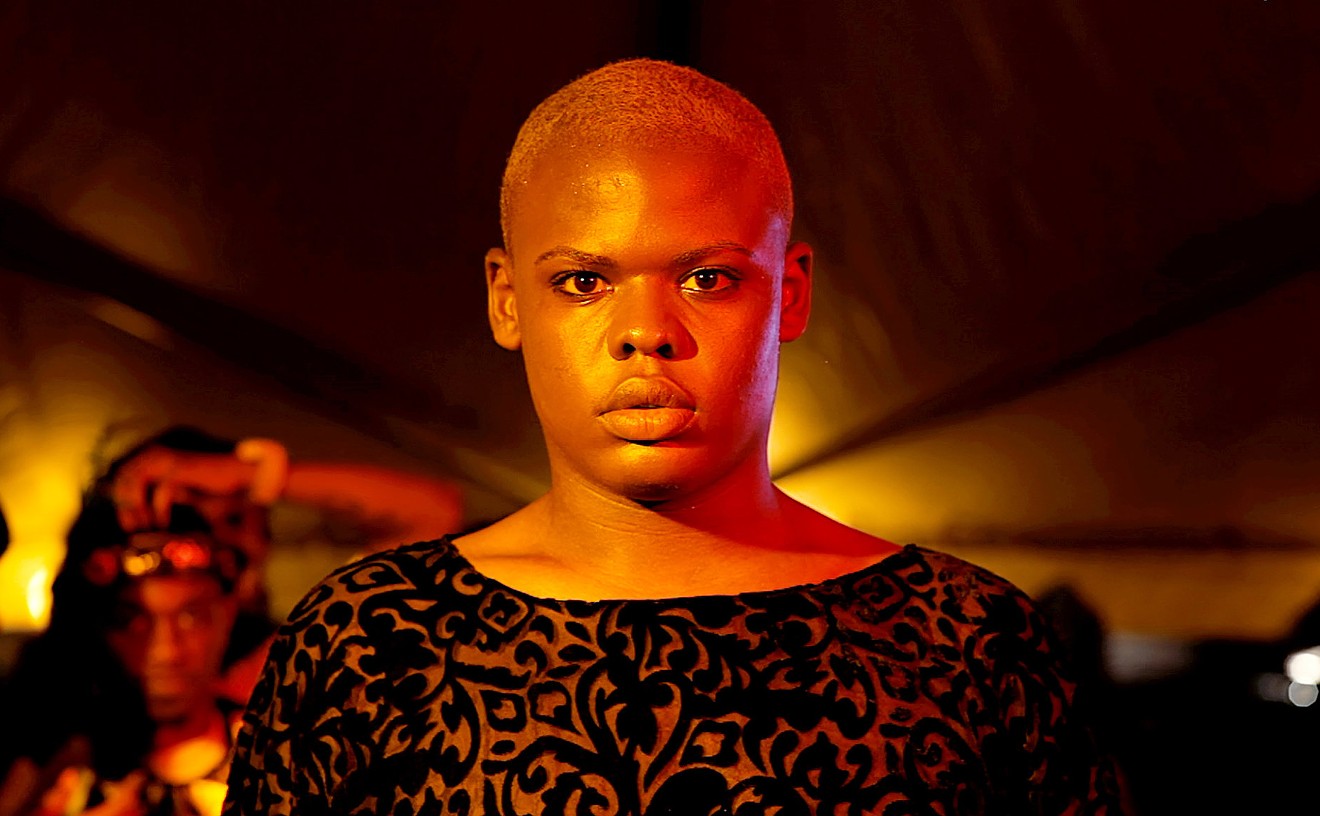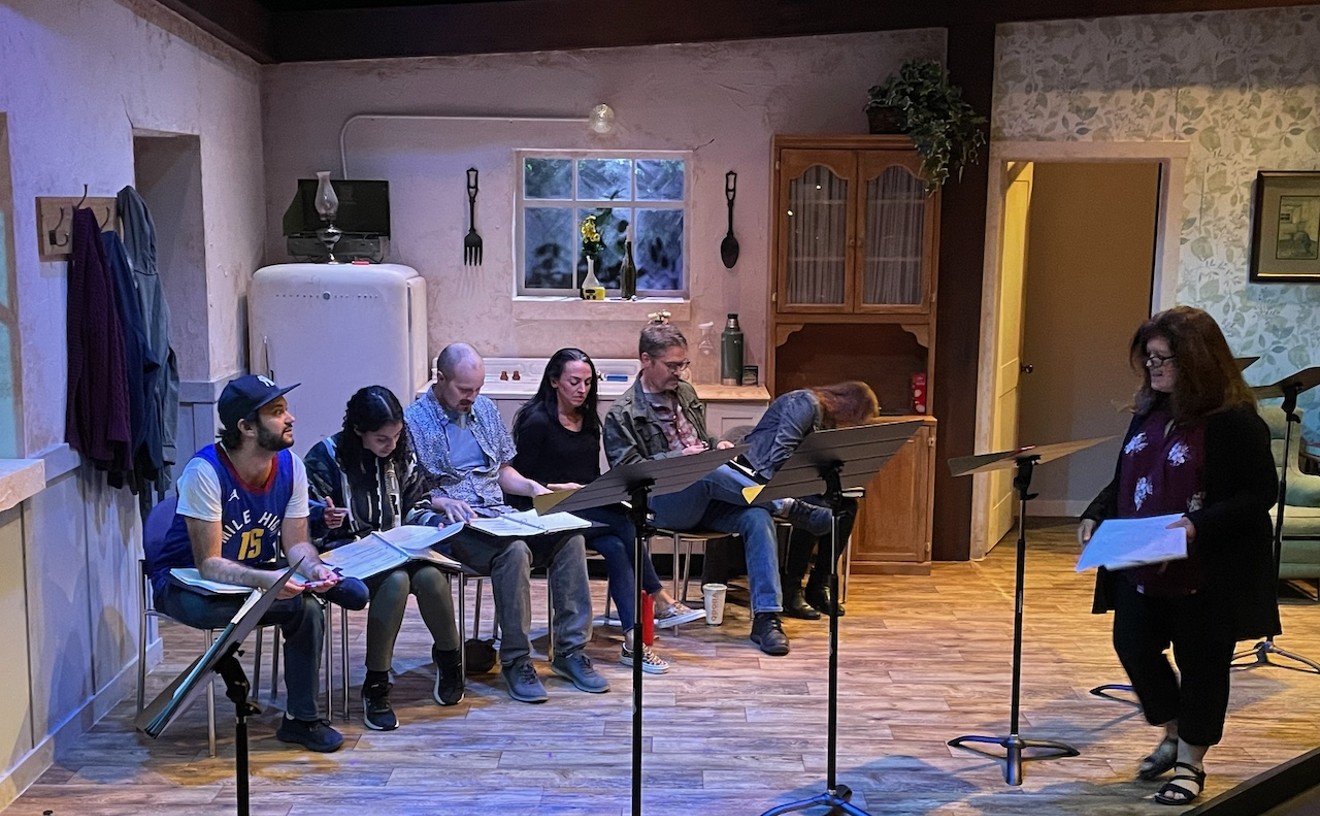It was a hot evening when I saw Pinter Early & Late at Germinal Stage, and the tiny theater was sometimes uncomfortably warm. The sound in the space is efficient — you can hear every word — but without the clarity and crispness ideal for Pinter. And yet the production confirms what I’ve always believed: Good theater isn’t about anything external. All you need is a fine script and fine actors.
A traditional dumbwaiter is an unwieldy, clanking contraption used in restaurants to convey food from the kitchen to the upstairs dining room. In the first play, The Dumb Waiter, written by Harold Pinter in 1957, two men — Ben and Gus — are waiting in a nondescript room. Ben is trying to read the paper, and there’s some trivial chat about making tea and whether it’s correct to say “light the kettle” or “put on the kettle.” They discuss the pattern on the cups and plates, then realize they can’t light the kettle or put it on, because neither has a shilling for the meter. The atmosphere vibrates with a mix of boredom, incomprehension and tension. We realize the men are hired killers, waiting for their next victim. Gus seems to harbor some ambivalence, however. Their last kill, a young girl, was a mess, he comments, because “women don’t hold together like men.” Inexplicably, food orders start coming through the tube beside the dumbwaiter. At first they’re for good old English standbys like liver and onions and jam tart, and then for such baffling dishes as macaroni pastitsio and ormitha macarounada. Ben and Gus respond as best they can, rooting through the bag of snacks Gus has brought with him and offering up chips and candies to the invisible presence above. And all the while the sense of menace thickens.
Celebration, first produced in 2000, takes place in an elegant London restaurant. At one table sit two couples: sisters Julie and Prue and their husbands, brothers Lambert and Matt; they are celebrating Lambert and Julie’s wedding anniversary. These people are clearly wealthy, but we don’t know how they acquired their wealth. Lambert and Matt, both vaguely thuggish, claim to be strategy consultants. At another table are banker Russell and Suki, the latter of whom who says she used to be a secretary and purrs about her intimate knowledge of the backs of filing cabinets. There’s no sense of existential menace skulking beneath the ordinary and trivial here, as there is in The Dumb Waiter. Instead, Celebration portrays a hideous society comprised of viperish people. These diners don’t remember how they’ve spent the evening. They may have been to the ballet — where, they say, the performers had trouble hitting the high notes — or perhaps the opera, which featured “a lot of singing.” They also don’t know what they’re eating — though Julie does remember enough of her duck to comment that she’s unimpressed, and Prue amplifies when restaurateur Richard approaches: “She said she could cook better than that with one hand stuffed between her legs.... She said she could make a better sauce than the one on that plate if she pissed into it.”
There’s no warmth anywhere, least of all between spouses. Lambert seems to recognize a girl he once loved in hostess Sonia, but she doesn’t remember or doesn’t care. The sisters occasionally gang up on the brothers, but there’s no affection between them, either.
Unbelievably insulting things are said, and the response is never what you expect. The recipients of the insults ignore or deflect them, seem to half enjoy them or take oblique revenge. Through all this sail impeccably mannered Richard, seductive Sonia and an unnamed waiter, who interrupts the action periodically to reminisce about his grandfather, who, he says, hung out with Ernest Hemingway, Hedy Lamarr, T. S. Eliot and pretty much every major luminary of the first half of the twentieth century. Although Celebration flays the skin off its characters, it’s still outrageously funny.
The bare set and costumes are unobtrusively effective in both pieces, and the acting is strong, with particularly fine performances from Thomas Borrillo as Ben in The Dumb Waiter and Lambert in Celebration, and Terry Burnsed — a Denver treasure we should see on stage more often — playing Gus and Celebration’s garrulous waiter. It’s rare to be challenged, enlightened and entertained all at once — but, hey, this is Pinter, master of crystal-clear ambiguity.
Pinter Early & Late, presented by Germinal Stage Denver through July 12, Avenue Playhouse, 7287 Lowell Boulevard, Westminster, 303-455-7108, germinalstage.com.
[
{
"name": "Air - MediumRectangle - Inline Content - Mobile Display Size",
"component": "12017618",
"insertPoint": "2",
"requiredCountToDisplay": "2"
},{
"name": "Editor Picks",
"component": "17242653",
"insertPoint": "4",
"requiredCountToDisplay": "1"
},{
"name": "Inline Links",
"component": "18838239",
"insertPoint": "8th",
"startingPoint": 8,
"requiredCountToDisplay": "7",
"maxInsertions": 25
},{
"name": "Air - MediumRectangle - Combo - Inline Content",
"component": "17261320",
"insertPoint": "8th",
"startingPoint": 8,
"requiredCountToDisplay": "7",
"maxInsertions": 25
},{
"name": "Inline Links",
"component": "18838239",
"insertPoint": "8th",
"startingPoint": 12,
"requiredCountToDisplay": "11",
"maxInsertions": 25
},{
"name": "Air - Leaderboard Tower - Combo - Inline Content",
"component": "17261321",
"insertPoint": "8th",
"startingPoint": 12,
"requiredCountToDisplay": "11",
"maxInsertions": 25
}
]











